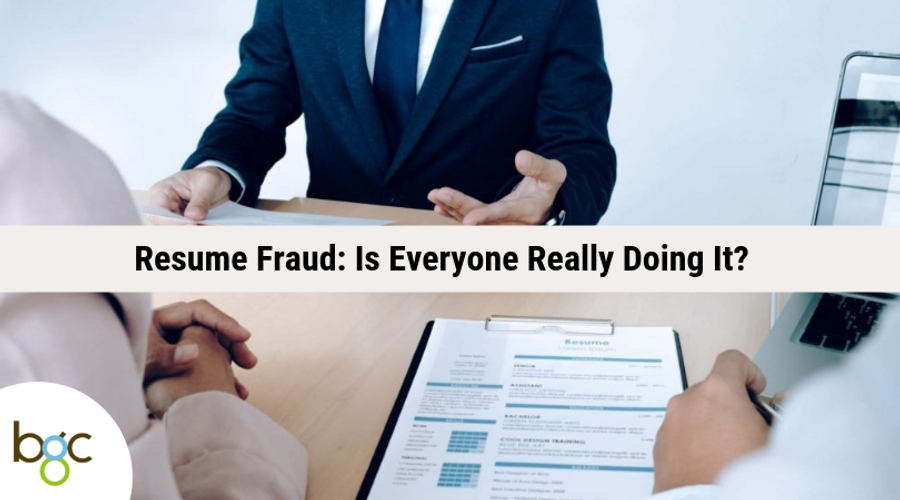You’d be surprised to find out that in Singapore, resume fraud is on the rise. These little alterations might seem like white lies (i.e. adding in false jobs to make up for resume gaps). But these discrepancies can affect both your credibility and the future of your career in Singapore.
In Singapore, it is reported that 3 out of 10 job applications analyzed had discrepancies such as employment history, education, and financial status. In fact, resume fraud is so common that research states that 50% of job applicants lie on their resume in some fashion.
So why are people putting themselves at risk by lying in their resumes? Whether they’re applying for a full time, part-time, or temp job, candidates in Singapore feel pressured to stand out in their resumes. This is due to the strong competition available in the job market in Singapore, which leads some people to falsify things on their resume.
Types of Resume Fraud in Singapore

Alter employment dates: Some employees have taken to altering their employment dates to cover up their resume gaps.
Rephrase job titles: Whilst others rephrase either the keywords or job titles to make their resume sound more relevant. This is also a method used by employees who want to dupe certain resume screening software.
Falsifying credentials: Certain jobs might require specific academic qualifications and certifications. In an attempt to get ahead, some might consider lying about their educational background.
Claiming false achievements: These can include achievements earned both at work and/or University. Achievements are often a great way to buff out a resume and job seekers might falsify some educational and employment achievements in an attempt to make their resumes more palatable.
Faking professional references: Falsifying professional references is perhaps one of the most common types of resume fraud. This is harder to screen as most professional references are friends, vouching that the candidates have worked in their office.
Failing to mention criminal record: Probably the scariest one of all. Having a criminal record disallows you from working in certain industries and jobs (i.e. preschool teacher).
To combat resume fraud, recruiters will ask questions based on the information reflected in your resume. For instance, hiring managers who are unsure of your academic credentials will ask you for academic transcripts, or even copies of your degree.
Other things recruiters and hiring managers do to screen job seekers include:

Hold quizzes: When it comes to distinct skills and knowledge. Hiring managers might quiz or hold a test to check if the candidate has the appropriate knowledge needed.
Psychological testing: Depending on the field you’re applying to, some candidates might be required to go through psychological screening to identify inappropriate behaviours.
Applicant Tracking System (ATS): An ‘Applicant Tracking System’ is one that runs through CVs and/or resumes to find the best candidates for the hirer. If you’ve submitted your details once through an ATS and choose to apply for another job through the same system. The ATS may be able to pick out the discrepancies in your application and blacklist you.
Call references and/or place of employment: Checking references is a crucial step to any employment process in Singapore. This old school technique allows hirers to check the candidate’s work habits. Coincidentally, this method also indirectly confirms whether or not the candidate worked at the organization.
Consequences of Resume Fraud
There are multiple consequences to resume fraud, affecting both the job seekers and the organization.
Candidates

Depending on the job, industry, and the severity of the resume. Legal action can be pursued against the deceptive candidate. If the candidate’s lies are caught before official hiring has taken place, the candidate can risk being blacklisted from applying for future positions with the company. However, if the candidate has been hired by the organization, they risk termination.
Organization

An organization who hires a fraudulent candidate can risk tarnishing their reputation. It shows that the company has failed to vet the candidate. Which means that they’ve skimped during the hiring process. Additionally, it can also cause distrust amongst employees.
Resume fraud is not uncommon in Singapore. Here are some of the most popular cases of fraudulent resumes over the years:
2012
Former NUS professor Anoop Shanker was found to be guilty of falsifying his credentials after his teaching stint in Singapore’s prestigious university, NUS. Shanker claimed to have received his Doctorate in Epidemiology and was allegedly awarded a “genius” visa to America.
Read more about the case here.
2015
A business school owner was caught running a scam that sold fake degrees. After doing this for four years and scamming more than S$2.5 million from students. The perpetrator was sentenced to five and a half years in jail.
Read more about the case here.
2019
A 49-year-old man was sent to prison for forging his academic qualifications. The man used his qualifications to get civil engineering jobs at 38 different companies. He falsified both his secondary school, polytechnic and degree qualifications. Additionally, the man also claimed to have 16 years of engineering experience in his resume. This turned out to be a false claim.
Read more about the case here.
Experience Over Qualifications

Fortunately, organizations are starting to favour work experience over academic qualifications. However, career chasers should understand that this takes both time and hard work. Just like that one Drake song, we must all start from the bottom. Sorry for the preach!
Thankfully, there are a variety of ways to build your work experience. Some of them include:
Internships: If you’re pursuing either a diploma or a degree, an internship is a good way to buff your resume up.
Part-time and Temp Jobs: Taking up a part-time or a temp job in Singapore is a good way to build some experience for a full-time job in the future. Just remember to apply for jobs in positions that relate to your ideal career. Alternatively, a role with transferable skills can also greatly benefit your resume!
As a recruitment company in Singapore, BGC Group offers a wealth of different part-time and temp jobs to help you bridge your path to success. View BGC Group’s job portal here. Or keep a lookout for more open positions on our Facebook page (BGC Singapore).Volunteering Experience: Do you need something to fill up your time over the weekend? Volunteering for a cause that you’re passionate about is an amazing way to make friends, as well as gather both skills and experience.
What do you do to make your resumes more appealing to recruiters? Let us know in the comments section below!
Recommended Reads:
Job Agility Could be the Secret to Success for Millennial Employees in Singapore
5 Reasons to Apply for a Job Through a Job Recruitment Agency
What Our Interns Actually Think of Temporary Jobs: Ben
